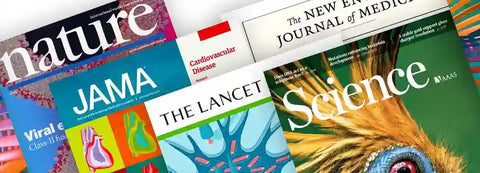Formelle wissenschaftliche Prosa und erfolgreiche Veröffentlichung | Tipps, wie Sie Ihre Forschung veröffentlichen können
Im einundzwanzigsten Jahrhundert gibt es eine Vielzahl informeller Möglichkeiten, Texte zu verbreiten, selbst die Arten von akademischen und wissenschaftlichen Texten, die einst ausschließlich den wissenschaftlichen Zeitschriften und Verlagen vorbehalten waren. Die Weitergabe von Forschungsergebnissen über Facebook, eine sozialere Plattform mit eher professioneller Ausrichtung oder einen persönlichen Blog oder eine Website kann eine gewisse Informalität in Sprache und Ausdruck fördern. Eine solche Informalität kann, wenn sie mit Maß und Bedacht eingesetzt wird, fortgeschrittene Forschung sogar für ein breiteres Publikum zugänglich und ansprechend machen, als es strenge Formalität vermag. Es ist jedoch wichtig zu bedenken, dass eine autoritative Stimme eine wertvolle akademische Ressource ist, und formelle wissenschaftliche Prosa bleibt ein äußerst effektives Mittel, um eine solche Stimme zu etablieren. Was die Veröffentlichung betrifft, so wird formelle wissenschaftliche Prosa von akademischen und wissenschaftlichen Verlagen immer noch erwartet, und das Vernachlässigen dieser Anforderung führt zu Ablehnung oder im besten Fall zu Überarbeitungen, um das Problem zu beheben.
Zu den häufigsten informellen Elementen, die oft unbemerkt in ansonsten wissenschaftliche Prosa einschleichen, gehören Kontraktionen. Beim Bloggen über seine oder ihre neuesten Forschungen kann ein Autor durchaus Kontraktionen wie „I’ll“, „we’re“ und Ähnliches verwenden, um eine lockerere Atmosphäre zu schaffen und für die Leser freundlich und zugänglich zu wirken. In einem solchen Kontext können diese Kontraktionen durchaus wirksam sein, ohne die geteilten Informationen zu beeinträchtigen. Bei formellen Aufsätzen und Aufgaben für Universitätskurse sowie bei Dissertationen und Abschlussarbeiten für höhere Abschlüsse hingegen werden Kontraktionen jeglicher Art in der Regel nicht toleriert, es sei denn, sie sind in Zitaten enthalten oder werden direkt als Teil eines wissenschaftlichen Arguments diskutiert. Dasselbe Prinzip gilt bei der Einreichung eines Dokuments zur Veröffentlichung, daher ist es ratsam, akademische und wissenschaftliche Texte sehr sorgfältig Korrektur zu lesen und dabei besonders darauf zu achten, alle Vorkommen solcher Kontraktionen zu eliminieren, bevor die Arbeit an einen Akquisitionsredakteur gesendet wird.
Einer der häufig gegen formelle wissenschaftliche Prosa vorgebrachten Vorwürfe ist, dass sie prätentiös klingt, aber gut geschriebene wissenschaftliche Prosa ist präzise, nicht prätentiös. Zum Beispiel könnte es für einen Autor nützlich oder notwendig sein, eine große Auswahl an spezialisiertem Fachvokabular, disziplinspezifischem Jargon und einzigartigen Abkürzungen in einem Artikel zu verwenden. Wenn dieser Autor diese Elemente jedoch achtlos und ohne Erklärung in seinen Text einfügt, kann das Schreiben durchaus prätentiös wirken, und der Gesamteindruck könnte sein, dass der Autor die Sprache, die er verwendet, nicht vollständig versteht. Ja, ein solches Schreiben kann diejenigen, die die Bedeutung dieser obskuren Sprache verstehen, das Gefühl geben, „im Bilde“ zu sein, aber es ist wahrscheinlich, dass sie sich dessen bereits bewusst sind, und eine solche Vorgehensweise wird nur andere Leser entfremden, verwirren und verlieren. Die Verwendung solcher Begriffe und Abkürzungen auf das notwendige Minimum zu beschränken und jeden verwendeten Begriff zu erklären oder zu definieren, wirkt hingegen klar, informiert und professionell, und alle Ihre Leser, einschließlich der Korrekturleser für Akquisitionen und Gutachter, werden Ihre Präzision schätzen.
Andere Elemente einer formellen wissenschaftlichen Ausdrucksweise sind subtiler und schwerer zu definieren, aber viel kann durch umfangreiches Lesen der Publikationen in Ihrem Fachgebiet und Themenbereich gelernt werden. Die für Ihr Fachgebiet angemessenen Standards und Konventionen treten immer wieder auf und dienen als ausgezeichnete Modelle für Präsentation, Wortschatz und Formulierungen. Wenn Sie Glück haben, können einige der wissenschaftlichen Stimmen, denen Sie begegnen, Sie sogar mit einer Schreibweise inspirieren, die ebenso interessant und wirkungsvoll ist wie die Forschung, die sie beschreibt. Autoren dieser Art bieten Höhen wissenschaftlicher Leistung, nach denen Sie streben können, wenn Sie Ihre eigene Forschung zur Veröffentlichung vorbereiten.
Warum unsere Korrektur- und Lektoratsdienste?
Bei Proof-Reading-Service.com bieten wir die hochwertigste Bearbeitung von Zeitschriftenartikeln, Korrekturlesen von Dissertationen und Online-Korrekturlesedienste durch unser großes und äußerst engagiertes Team von akademischen und wissenschaftlichen Fachleuten an. Alle unsere Korrekturleser sind englische Muttersprachler, die eigene postgraduale Abschlüsse erworben haben, und ihre Fachgebiete decken ein so breites Spektrum an Disziplinen ab, dass wir unserer internationalen Kundschaft bei der Forschungsbearbeitung helfen können, um alle Arten von akademischen Manuskripten für eine erfolgreiche Veröffentlichung zu verbessern und zu perfektionieren. Viele der sorgfältig geschulten Mitglieder unseres Manuskriptbearbeitungs- und Korrekturleseteams arbeiten überwiegend an Artikeln, die für die Veröffentlichung in wissenschaftlichen Zeitschriften bestimmt sind, und wenden akribische Zeitschriftenbearbeitungs-Standards an, um sicherzustellen, dass die in jedem Artikel verwendeten Referenzen und Formatierungen den Autorenrichtlinien der Zeitschrift entsprechen und um Grammatik-, Rechtschreib-, Interpunktions- oder einfache Tippfehler zu korrigieren. Auf diese Weise ermöglichen wir unseren Kunden, ihre Forschung klar und präzise darzustellen, wie es erforderlich ist, um die Korrekturleser der Verlage zu beeindrucken und eine Veröffentlichung zu erreichen.
Unsere wissenschaftlichen Korrekturlesedienste für Autoren einer Vielzahl wissenschaftlicher Zeitschriftenartikel sind besonders beliebt, aber wir bieten auch Manuskript-Korrekturlesedienste an und verfügen über die Erfahrung und Expertise, Manuskripte in allen wissenschaftlichen Disziplinen sowie darüber hinaus zu korrigieren und zu bearbeiten. Wir haben Teammitglieder, die sich auf medizinische Korrekturlesedienste spezialisiert haben, und einige unserer Experten widmen ihre Zeit ausschließlich der Dissertationskorrektur und Manuskriptkorrektur, wodurch Akademikern die Möglichkeit geboten wird, ihre Formatierungs- und Sprachkenntnisse durch die anspruchsvollsten PhD-Thesenbearbeitungen und Zeitschriftenartikel-Korrekturlesungen zu verbessern. Ob Sie ein Konferenzpapier zur Präsentation vorbereiten, einen Fortschrittsbericht zur Weitergabe an Kollegen überarbeiten oder sich der schwierigen Aufgabe stellen, jede Art von wissenschaftlichem Dokument für die Veröffentlichung zu bearbeiten und zu perfektionieren – ein qualifiziertes Mitglied unseres professionellen Teams kann Ihnen unschätzbare Unterstützung bieten und Ihnen mehr Vertrauen in Ihre schriftliche Arbeit geben.
Wenn Sie gerade einen Artikel für eine akademische oder wissenschaftliche Zeitschrift vorbereiten oder dies in naher Zukunft planen, könnte Sie ein neues Buch interessieren, Leitfaden zur Veröffentlichung in Zeitschriften, das auf unserer Website Tipps und Ratschläge zur Veröffentlichung von Forschung in Zeitschriften verfügbar ist.








